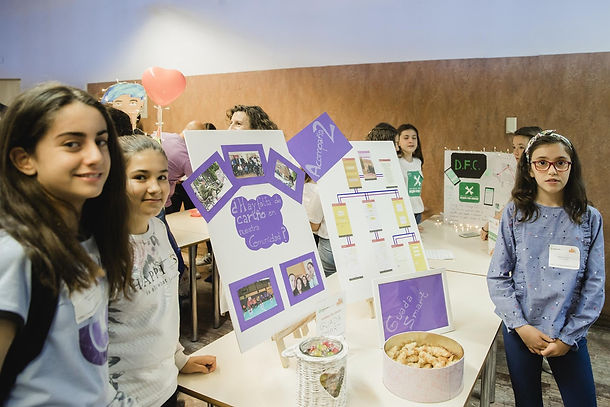Technovation Challenge Madrid: Girls for a change
Overview
Context
Action
Impact
Lessons Learned
References
Other Resources
Overview
Organiser:
Power to Code
Region:
Europe and Nothern America
Keywords:
Adolescents, Coding, Entrepreneurship, Family, Leadership, Private sector, Skills development, Science, technology, engineering and mathematics (STEM), Teachers
Project Type:
Advocacy and coalition-building, Career counselling and professional development, Non-formal education and extracurricular contexts, Prizes, competitions and special events, Role models and mentoring
Country:
Spain

Share:
Context
According to GSMA’s 2020 Mobile Gender Gap Report, 80% of women globally own a mobile phone. These global figures, however, hide the persistent digital gender divide that exists worldwide, particularly in low- and middle-income countries. Here, 300 million fewer women than men access the internet on a mobile, and women are 8% less likely than men to own a mobile phone.
Gender gaps also exist in digital skills. EQUALS research documents that women in numerous countries, including Spain, are nearly 25 per cent less likely than men to know how to leverage information and communication technologies (ICT) for basic purposes, such as using simple arithmetic formulas in a spreadsheet. Further along the skills spectrum, the divides grow wider. According to the Organisation for Economic Co-operation and Development, across G20 countries just 7% of ICT patents are generated by women.

Heading 5
Action
Founded in 2016, Power to Code is a nonprofit organization in Spain aiming to reduce the gender gap in technology by empowering women to become leaders in this field. This is achieved by promoting science, technology, engineering and mathematics (STEM) vocations, focused on programming, technology and entrepreneurship.
Power to Code runs the Technovation Challenge Madrid event targeting girls aged 10 to 18. Technovation Challenge is the world’s largest global tech entrepreneurship programme for girls. In teams guided by mentors, girls create mobile apps to solve social problems in their communities and compete in a global competition with more than 120 countries.
The programme consists of a 12-week team-based educational curriculum delivered from January through April. The main objective of the group project is to build knowledge and skills in different STEM disciplines, in particular technology, among girls and their families. Concepts that are not yet discussed in the school curriculum are addressed, such as the programming of mobile applications. At the end of the programme, participants have a fully functional application that they made themselves.
Technovation Madrid also aims to reduce the gender gap in the choice of educational pathways that occurs in the fourth year of secondary school. Girls learn about various technological skills, meet women in tech, and have the opportunity to interact with hundreds of girls and young participants. Companies such as Mastercard and Microsoft provide volunteers through their Corporate Social Responsibility programmes, universities including Madrid’s University Carlos III organize aspirational activities for young participants and many other entities provide support or awards. Educators are also part of the target audience so they can advocate and support their students in the programme.
Impact
Since Power to Code started with only seven girls in Madrid, it has grown to reach around 600 participants in 2019.
The second year, the model was replicated with the establishment of centres in two locations In its third year, Power to Code was introduced in companies such as Amazon, Airbus and Microsoft within their diversity programmes, and students from the University Carlos III provided mentoring to teams of girls. Last year, some teams were incorporated from schools and were led by teachers and parents. Several companies and three municipalities also launched the programme as part of their activities.
For future editions of the Technovation challenge in Madrid, Power to Code will launch a club model. Participants to these clubs will have a dedicated coordinator who will directly interface with the Power to code team.
Power to Code also runs other activities such as The Hour of Code workshops, and Mother-Daughter Printathons with Tinkercad. Visits to companies and universities are also organized for girls participating in the main programme to learn about the different opportunities in tech and interact with women role models.
Lessons Learned
It is important that the project’s curriculum allows the model to be replicated and scalable.
Disseminating the programme in various locations from schools and municipal centres to companies and institutions helps widen the participants’ numbers, age and range.
Additional local activities for the participants are essential. These can be workshops on various STEM disciplines, visits to companies and professional and motivational talks.
Through the app, participants can enter international competitions, present their project at a regional event, with the possibility of promoting the world semifinal online and the world final in Silicon Valley in the United States.
References
EQUALS Research Group. 2018. Taking stock: Data and evidence on gender equality in digital access, skills and leadership. Preliminary findings of a review by the EQUALS research group. Geneva: International Telecommunications Union (ITU).
UNESCO. 2017. Cracking the code: Girls’ and women’s education in science, technology, engineering, and mathematics (STEM). Paris, UNESCO.
Other Resources


